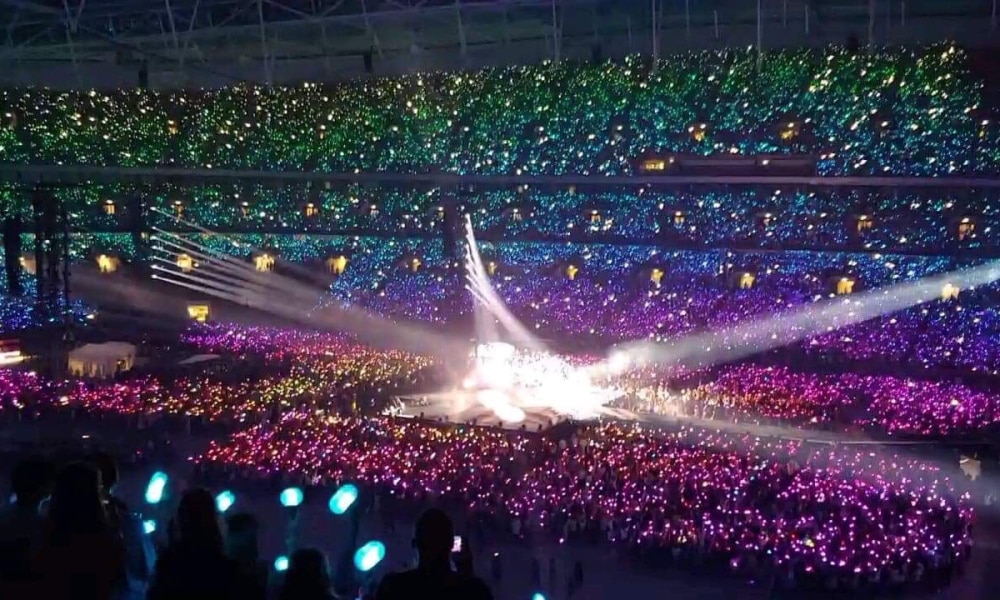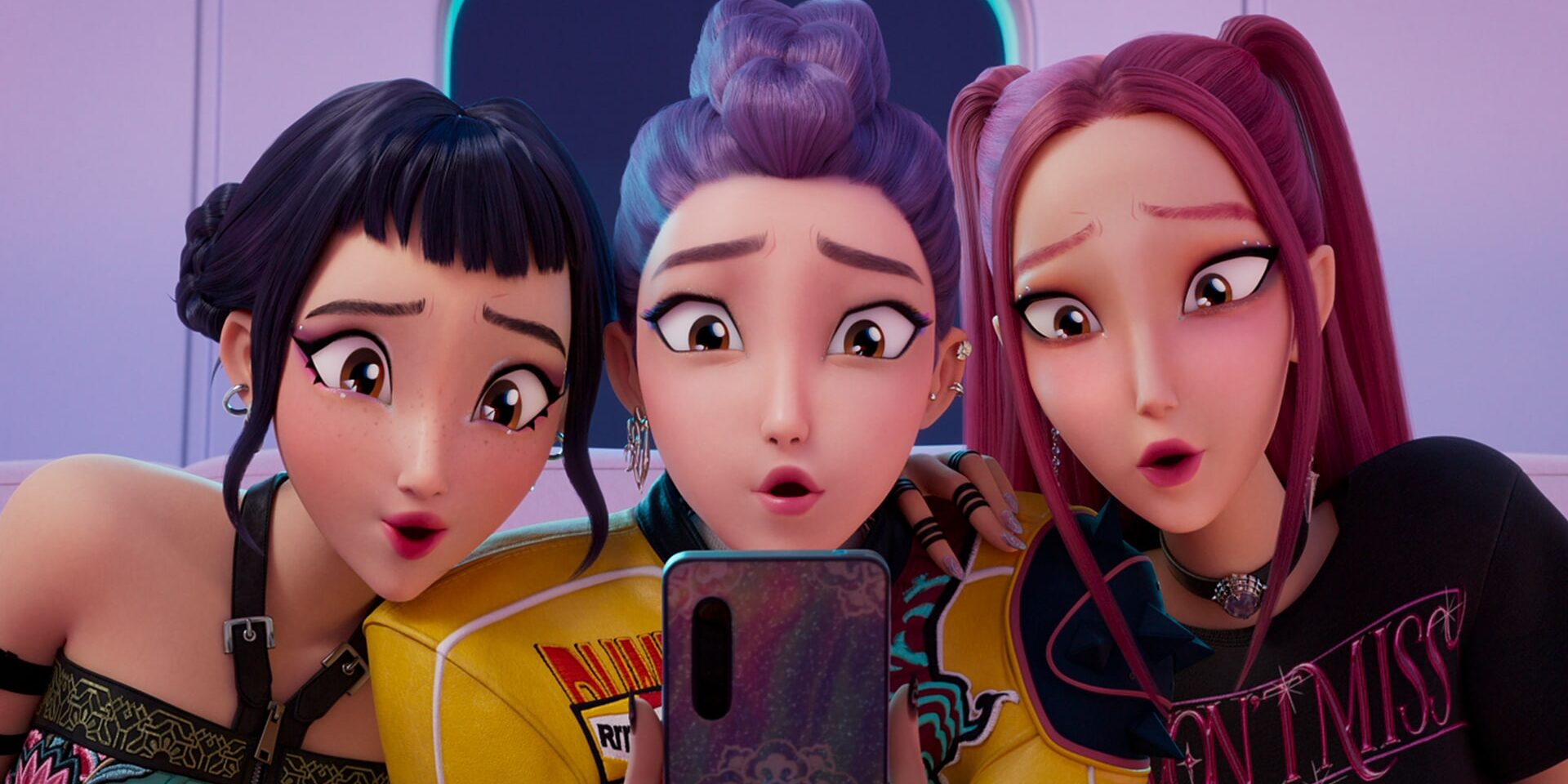It’s not an exaggeration to say that worldwide, people of all genders, ages, and colors simply cannot get enough of HUNTR/X or the Saja Boys. Almost three months since it dropped, KPop Demon Hunters has smashed Squid Game’s four-year reign as Netflix’s most-watched title ever. It’s been reported that Ryan Reynolds has seen KPDH 50 times, and Novak Djokovic celebrated winning the quarterfinals of the US Open by dancing to “Soda Pop.”
Since its June 20th release, KPDH’s 314 million hours watched have vaulted over Squid Game Season One’s 265 million hours. (Netflix stops counting after 91 days). Globally, it’s charted in the top ten in 93 countries.
Who could have guessed that a demon-slaying girl group could rally a planetary battle cry against self-doubt and despair? Or, in less lofty terms, who could have predicted that KPop animation would offer a perfect 95-minute escape from what may feel like a world on fire?
The short explanation for KPop Demon Hunters’ world domination is that it’s a great movie with a killer soundtrack. Besides being Netflix’s most-watched title, KPDH has a 97% Rotten Tomatoes score and a soundtrack that just keeps breaking records. KPDH stands alone with four songs simultaneously in the Top Ten of Billboard’s Hot 100. (Waiting to Exhale and Saturday Night Fever have three.) HUNTR/X is also the first girl group since Destiny’s Child to reach #1 on the Hot 100 with “Golden.”
At its heart, it’s a fun, girl-boss story of KPop superstars committed to protecting a magical barrier that separates the human and demon worlds. Throw in stunning animation and an impossibly gorgeous demonic boy band and… you’ve got an epic summer juggernaut that shows no signs of slowing down.
It’s not a tale as old as time, but it’s a tale that captures this moment in time. As more and more communities silo themselves into smaller and darker groups, KPDH offers a spark of hope that connection, not contraction, is the answer. Like the best of discoveries, what’s alluringly exotic on the outside reveals itself to be universal on the inside.
“Lately, in both Pop and KPop, I haven’t seen many songs at the top of the charts that center around hope,” said KPDH creator Maggie Kang. “Yet I feel like we’re living in a time where the world is collectively longing for it.”
A Star Is Born
Everyone involved in KPDH has found themselves launched into the stratosphere of their careers. But EJAE is the Han Solo of Demon Hunters. As George Lucas once told it, Harrison Ford was a failed actor working as a carpenter on the set of Star Wars. Lucas asked Ford to read some lines during auditions for Han Solo, only to realize that no one else could do it better.
Prior to EJAE being hired to help create the music for Demon Hunters, she slogged through the idol trainee system for 11 years before aging out. EJAE then worked behind the scenes in the KPop industry (and co-wrote/co-produced four KPDH songs). But she only became Rumi’s singing voice after laying down demo tracks—at which point the decision-makers emphatically agreed that no one could sing it better.

EJAE goes from KPop girl group dropout to singer-songwriter fame on KPop Demon Hunters. Image credit: Good Morning America
“I just kept saying, ‘EJAE, your voice is unlike anything I’ve ever heard,’” said Ian Eisendrath, KPDH’s executive music producer, to Time magazine. “[EJAE] was the North Star for us throughout the process… What she does in ‘Golden’ is insane… Get ready for everyone to try to sing these songs and not be able to. They were tailored for EJAE’s freakish vocal abilities.”
Beyond her “bonkers” vocal range, EJAE’s first-hand knowledge of the trainee trenches allowed her to embody Rumi’s struggles and emotions, adding another dimension to the songs as she belted out those chart-topping hits.
“I felt the pressure to always be perfect [as a trainee]. I understood the overwhelming urge to hide your flaws and the things you feel ashamed of, and how exhausting it is to maintain a façade of being okay instead of asking for help.”
Getting It Right
KPDH’s creative team never underestimated the wizardry that is KPop. And they never forgot that all the Korean aspects had to ring true. The Seoul locations, the food, the culture, all of it had to be truly Korean to the core.
One way they stayed authentic to Korean culture is by confronting the theme of shame. Shame is a central tenet of Confucianism. And as it surfaces in the film as a recurring/underlying theme, it will strike Koreans as an all-too-familiar struggle. In a Confucian society like Korea, where perfectly playing an assigned role in your community/family is paramount, children are taught from an early age to cultivate moral character through a deep sense of shame—yet this same force can become profoundly debilitating, silencing individuals, isolating them, and compelling them to wear masks throughout their lives. In KPDH terms, its undeniable global reach shows that Korea is far from the only country where individuals feel pressured to hide themselves behind false, idealized personas.
“We knew we wanted to tell a story about shame,” said Kang. “It’s an older-skewing theme, and it’s dark.”
Equally important was keeping what makes KPop special at the forefront—namely, the next-level harmonies, visuals, dance, and fashion, all drilled to perfection in the notoriously demanding idol trainee program. Not surprisingly, the KPDH soundtrack was produced in part by some of the same talent behind the epic success of BTS and BLACKPINK.
“The day after I sold this [film], I went to a BTS concert at the Rose Bowl and I witnessed 50,000 fans knowing every line to a Korean song that even I didn’t really know… I was like, ‘Wow. This is insane.’ This magic is palpable: you can taste it and feel it,” recalled Kang. “And that really inspired the magic and all the tingles that you feel in the movie.”

BTS Concert at Wembly Stadium. Photo courtesy of Dr. Colette Balmain
Fan Service: KPop’s Extra… Something
The expectations, exposure, and devotion that flow in both directions are some of the ways that KPop is a different breed. In Western pop, bands and solo artists typically average an album every two-ish years. In contrast, KPop acts often release two or more albums a year. Idols also regularly host fan meet-and-greets, frequently livestream for their fans, maintain a near-constant presence on social media, and are commonly featured on variety/reality shows.
Not surprisingly, KPop concerts are more lavish extravaganzas than mere musical performances. Fireworks, dazzling choreography, deafening chants, and many ab-baring shirt lifts are not only common—they’re expected. Part of KPDH’s secret sauce is how that exuberance is brought to life (or rather, to screen), by pulling viewers in and creating the sensation that they’re singing in the stands rather than watching from their couch.
“We knew the movie needed to highlight the importance of the fan-and-idol relationship because that relationship is unlike anything else in entertainment. There’s this true give and take between the performer and the audience,” Kang told Time. “When it’s great, there’s a lot of respect in that relationship. For us, having the crowd be part of the solution at the climax… to be this power source for the girls was always there.”
Idols Post Their Stamp of Approval
What’s more telling that the filmmakers got it right than Jung Kook of BTS livestreaming his viewing of KPDH—tearing up at parts and talking back to the screen: “No, you idiot… fight together!” and loudly urging the demons attacking Rumi: “No… Please… Don’t do that!”
If you haven’t been living under a rock, you’ve probably caught at least a few—if not dozens—of covers of the KPDH soundtrack. The most notable may be Jung Kook’s rendition of “Soda Pop.” In a full-circle, blurred fan-service moment, Jinu’s singing voice, Andrew Choi, rated Jung Kook’s cover “11 out of 10.”
Another fun affirmation showed J-Hope laughing with IVE backstage as they mimicked the Saja Boys and HUNTR/X repeatedly bowing to each other after a performance.
Up, Up, Up—It’s Our Moment
Kang seems to have caught lightning in a bottle by riding the Korean Wave, or hallyu, as observers call the global fascination with K-pop, K-dramas, K-food, K-beauty, K-tourism, and beyond. BLACKPINK and Stray Kids underlined 2025’s “K-moment” by dominating this year’s MTV Awards and becoming the only act on Billboard’s Hot 100 to debut every album at #1.
Any artist will tell you they’ve truly succeeded when fans are inspired rather than merely entertained. There may not be literal demons to slay, but for KPDH fans—many of whom have the film on repeat—the lyrics are anthems.
KPop Demon Hunters’ popularity may still puzzle some, but at this point it’s inescapable. And for holdouts resisting KPDH as a reflex toward rejecting Pop culture wholesale, KPDH is proof that highbrow doesn’t monopolize the artistic high ground. Sometimes elevated messages can come from animation: inspiring fans to be brave, accept (if not love) yourself, and fight the good fight.





